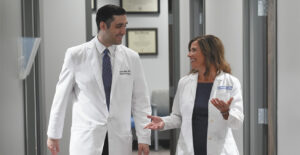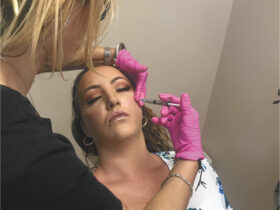A Window to Vision and Lifelong Learning
By Beth Richter, MD, PhD and George Skopis, MD
 The human eye is a magnificent structure of biological engineering, allowing us to perceive the world in vivid color and details.
The human eye is a magnificent structure of biological engineering, allowing us to perceive the world in vivid color and details.
At the crux of this organ lies the retina—a delicate, light-sensitive layer thinner than an index card which lines the back of the eye. The retina plays an essential role in vision by converting light into neural signals, which are then transmitted though the optic nerve to the brain. The retina and eye structures form the first step in the complex process of seeing.
Basic Anatomy of the Eye and Retina
The eye functions much like a camera. Light enters through the clear cornea, passes through the pupil (controlled by the iris, like a camera aperture), and is focused by the internal lens onto the retina. The retina contains two types of photoreceptor cells: rods, which are sensitive to light and allow for movement and night vision, and cones, which detect color and detail in bright light. The central part of the retina, known as the macula, is responsible for sharp central vision. At the very center of the macula is the fovea, where cone density is highest, allowing our most detailed vision. Damage or disease affecting the retina—such as macular degeneration, retinal detachment, or diabetic retinopathy—can severely impair vision. This emphasizes the importance of eye health in maintaining quality of life.
Lifelong Learning Principles and Neural Plasticity
Just as the retina transmits information to the brain, the brain constantly interprets, integrates, and learns from visual input. This capacity for learning and changing—known as neuroadaptation—remains active throughout life. Lifelong learning refers to the ongoing, voluntary pursuit of knowledge and skills. This is rooted in the brain’s ability to form new neural connections in response to experiences or other input. Learning can be formal, like taking classes in school, or informal, like reading, observing, or engaging with others. Vision plays a key role in most learning experiences, especially in early development. However, even in adulthood, activities like reading, observing art, completing puzzles, or exploring new environments continue to stimulate cognitive growth.
Connecting Vision and Learning
Healthy vision supports effective learning, and ongoing learning supports brain health. The interaction between the eye and brain is more than mechanical—this is a dynamic system that determines how we navigate and understand the world. By protecting our vision and nurturing our curiosity, we cultivate both our sensory and intellectual well-being for a lifetime.
We at Retina Group of Florida are here to help with any of your retinal or macular care needs. We know the importance of sight and hope to help you achieve the best vision possible for your goal of lifetime learning.
MEET THE PHYSICIANS
George Skopis, M.D.
George Skopis, MD is a board-certified ophthalmologist and fellowship trained vitreoretinal surgeon. Dr. Skopis specializes in surgical and medical diseases of the retina and vitreous. He strives to utilize the most advanced imaging, medical and surgical techniques to diagnose and treat patients. Dr. Skopis has expertise in age-related macular degeneration, diabetic retinopathy, retinal vascular occlusions, macular holes, macular pucker/epiretinal membranes, retinal detachments, proliferative vitreoretinopathy, and scleral fixated intra-ocular lenses.
Dr. Skopis grew up in Tarpon Springs, FL and graduated from Tarpon Springs High School. He received his Bachelor of Science Degree in Biology from The University of Florida where he graduated cum laude.
Elizabeth Richter, M.D., Ph.D.
Dr. Richter joined the Retina Associates of Sarasota after completing her two-year fellowship in vitreoretinal disease and surgery at the renowned Jules Stein Eye Institute at UCLA in Los Angeles, California. As a native of the southeast, she is an engineer-trained retina surgeon originally from Georgia. She earned dual undergraduate degrees in mechanical engineering (summa cum laude) from Georgia Institute of Technology and biology from Emory University, and her M.D. and Ph.D. degrees from the Medical College of Georgia. There, her thesis was in a laboratory that focused on virology and its effects on the retina in diseases such as Acute Retinal Necrosis.
3467 Pine Ridge Rd #103, Naples, Florida 34109
239-325-3970
www.retinagroupflorida.com








